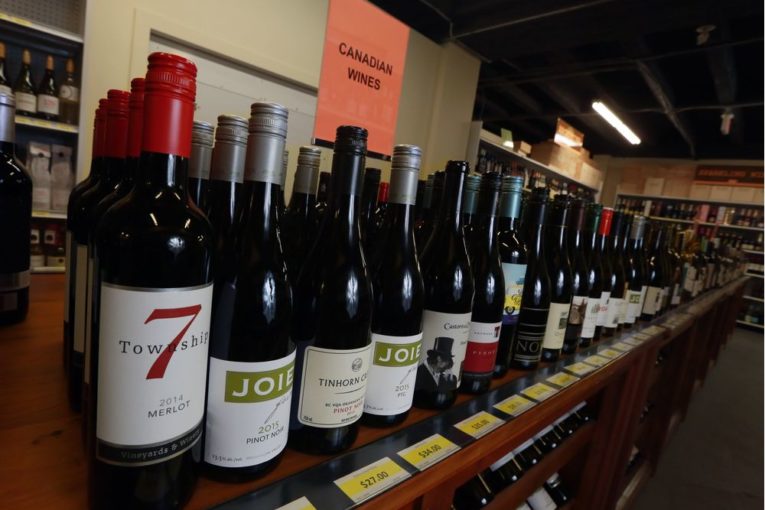
Sitting in her pyjamas writing a social media post last week, business owner Karen Collins didn’t plan on instigating a full-fledged blockade of British Columbia wines destined for Alberta.
The owner of the Astia Trattoria Italiana restaurant in Fort McMurray was fed up with the ongoing pipeline spat with B.C. and wanted to take action.
Her solution was simple: To support oilsands workers in her hometown, Collins was yanking all B.C. wines from her restaurant — it buys about $2,500 a month — and called on other establishments to do the same.
Collins got more than she bargained for.
The battle over bitumen took a sour turn Tuesday as Premier Rachel Notley announced Alberta will ban the import of B.C. wines to the province. About $70 million of product mostly from the Okanagan region is sold into this province each year.
“I didn’t mean to be a trend setter. It was a little posting on my own Facebook page to my customers to let them know I was no longer going to sell B.C. wines here. I felt it was important,” Collins said Tuesday.
“It wasn’t an attack on the B.C. wineries or the people who work in the vineyards. But they are attacking our economy and we are feeling the pain here.”
The premier’s office said Notley did see the “compelling” story of Collins call for a boycott, noting there’s been an overwhelming response from Albertans who wanted the province to respond to B.C.’s proposed restrictions on bitumen shipments.
“In this province, we are united on this issue and we are speaking with one voice,” Notley told reporters.
( function() { pnShowVideo( “1_q63kf7ju”, 658431, “”, “”, false, “”, “”, “kaltura”, “video”, null, null, “”, false ); } )();
The dispute between B.C. and Alberta has ramped up in recent weeks over the Trans Mountain pipeline expansion. The $7.4-billion development would triple the amount of oil being shipped from Alberta to the west coast for export.
As oil production increases and pipelines are running near full capacity, the discount facing Western Canadian heavy oil has soared since December.
Once Trans Mountain is completed, Notley said the project would generate an estimated $1.5 billion annually in benefits to the Alberta treasury. It would also improve oil prices for Alberta-based petroleum producers.
The National Energy Board approved the project in May 2016 and the Trudeau government gave the federal blessing later that year.
Despite clearing these hurdles, Trans Mountain faces stiff opposition in B.C. and project proponent Kinder Morgan is now a full year behind schedule on its project.
The latest flashpoint erupted last week after the Horgan government announced it would study proposed regulations to restrict the amount of diluted bitumen moving through the province by pipelines and rail.
B.C. said it’s concerned about the potential for a spill of diluted bitumen and wants to examine the issue further; Notley says the action is clearly unconstitutional, as interprovincial pipelines are federally regulated.
The reaction in B.C.’s wine industry was one of bewilderment on Tuesday afternoon, having been stomped by opposing political forces on either side of the Rocky Mountains.
The industry employs about 12,000 people in B.C. and supplies about 30 per cent of all wine bought in Alberta.
“We are just being used as a political football,” said Miles Prodan, president of the B.C. Wine Institute.
“We are being singled out because it plays well to the politicians and getting the voter base riled up on either side of the divide.”
Related
Two of the largest business groups in both provinces say it’s time for the federal government to step into the rumble.
“This sits squarely on the shoulders of our prime minister,” said Val Litwin, president of the B.C. Chamber of Commerce.
“What he’s failed to do, other than offer a smooth sound bite … is give a clear and unequivocal directive to the B.C. government that this project will be moving ahead.”
Alberta’s actions will likely violate the New West Partnership pact and Canadian Free Trade Agreement, which call for a free flow of goods and services between provinces.
The head of the Alberta Chambers of Commerce supports the wine ban, but worries the feud could soon expand into other economic areas, such as beef.
“This is how conflicts escalate,” said Ken Kobly of the chamber. “What concerns me is what’s coming next from either Alberta or B.C.”
Collins also wonders where the dispute is headed.
But, she notes, the energy sector is still struggling in Fort McMurray, following the 2016 wildfires and oil price collapse. Now B.C. is trying to prevent Alberta from getting its main export — oil — into new markets.
“As for a trade war, I hope it doesn’t get to that,” Collins added. “If anything, this is going to start a conversation — and nothing moves forward without a conversation.”
Chris Varcoe is a Calgary Herald columnist.
You can read more of the news on source
